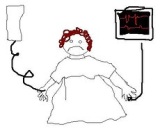November 2nd, 2010 by admin in Health Policy, Humor, Opinion, True Stories
No Comments »
This is a guest post from Carolyn Thomas:
 An Open Letter To All Hospital Staff
An Open Letter To All Hospital Staff
Dear hospital employees,
After a particularly bizarre experience undergoing a treadmill stress echocardiogram at your hospital recently, I decided to do something that I have never done before: I called the manager of the cardiology department to complain about her staff. (Incidentally, a recent opinion survey of international tourists found that Canadians were #1 in only one category: “Least likely to complain when things go wrong” — so you can appreciate that lodging an official complaint is a fairly big deal here!)
In my best PR fashion, I told the manager how distressing the appointment had been because of the behaviour of the two cardiac technicians in the room. It’s not so much that they were openly rude, but it was their insufferable lack of people skills that had pushed me over the edge. No introductions, no eye contact, no consideration of how awkward this test can be, no explanation of the test procedures or even the flimsiest effort at polite conversation. To them, I was merely the 1:00 o’clock appointment, the obstacle between them and their next coffee break, just a piece of meat on a slab — but worse, an invisible piece of meat. Read more »
August 31st, 2010 by Jeffrey Benabio, M.D. in Better Health Network, Health Tips
No Comments »

Having a high-quality doctor’s visit takes effort on your doctor’s and yours. Here are 10 tips to get the most out of your next visit with a dermatologist:
1. Write down all the questions you have and things you want to discuss with me. Be sure to list any spots you’d like me to check or any moles that have changed. Have a loved one lightly mark spots on your skin they are concerned about.
2. Know your family history: Has anyone in your family had skin cancer? What type? Patients often have no idea if their parents have had melanoma. It matters. If possible, ask before seeing me.
3. Know your history well: Have you had skin cancer? What type? If you have had melanoma, then bring the detailed information about your cancer. Your prognosis depends on how serious the melanoma was, that is its stage, 1-4. You need to know how it was treated, if it had spread, and how deep it was. The answers to these questions determines the risk of your melanoma returning. Read more »
*This blog post was originally published at The Dermatology Blog*
June 2nd, 2010 by RamonaBatesMD in Better Health Network, Health Policy, Interviews, Opinion
7 Comments »

There’s a nice article in the May issue of Plastic Surgery Practice that discusses how to deal with unhappy or difficult patients. No matter the area of medicine or surgery, you’re bound to have one or two of these patients over the years. It never hurts to learn or review tips in dealing with them.
In the article, Rima Bedevian interviews Julie Ann Woodward, M.D., chief of the oculoplastic and reconstructive surgery service at Duke University:
…how to successfully deal with them -– with compassion and humanity without allowing them to “run you over” or manipulate a difficult situation into a potentially litigious one.
Dr. Woodward provides a helpful checklist for doctors. Read more »
*This blog post was originally published at Suture for a Living*
August 13th, 2009 by BarbaraFicarraRN in Better Health Network, Health Tips
No Comments »

 A hospital can be extremely frightening and overwhelming.
A hospital can be extremely frightening and overwhelming.
Hospitals generally are loud, cold, and sterile mazes of chaos. Unfortunately medical errors happen and it’s estimated that nearly 100,000 people die of medical errors each year.
According to the CDC, “In American hospitals alone, healthcare-associated infections account for an estimated 1.7 million infections and 99,000 associated deaths each year.”
As a registered nurse on the front lines of the health care, I understand how important it is for patients and their families to take charge and be an advocate for their health.
In my role as an administrative head nurse, I always encourage patients and family members to be proactive in their health care. I am passionate about encouraging patients to be proactive and kudos to CNN, and Consumer Reports for recently addressing the issue of patient safety; and The Wall Street Journal for recently addressing the issue of parents being active to ensure their child’s safety in hospitals.
I’ve written on this topic before, I have been quoted in national magazines, talked about it on web/TV and I’ll continue to speak out regarding this critical topic.
While hospital safety may seem daunting, the good news is that you can be an empowered patient and help eliminate medical mistakes.
My top tips to keep you safe in a hospital
Carry your medication list and personal medical history form with you
During your admission assessment, whether you were brought to the ER or directly admitted to the hospital, you will be asked multiple times by multiple staff for a list of your medications, past hospitalizations, if you have any allergies and emergency contact numbers. Carry this personal medical history and medication form in your wallet at all times; in case of an emergency or for a scheduled hospital visit; you’ll be prepared.
(As an expert contributor to Real Simple Magazine, “In an Emergency,” this was my number one tip).
Believe you are empowered: Give yourself permission to be in charge, an engaged patient
Unless you know how to be assertive and believe that you are an empowered patient all the tips in the world won’t help. Treat your doctors and nurses as partners in your health care team.
Communicate in a non-threatening manner
Communication between patients and health care professionals are critical for positive patient outcomes. Communication is imperative for patient safety and good quality patient care. In a hospital, which is a very fast-paced environment, where seconds can mean the difference between life and death, it’s crucial that communication flows consistently and thoroughly between patients, their families and staff. Speaking up and communicating needs to be continuous.
The Joint Commission, otherwise known as JCAHO, launched a national campaign in 2002 to urge patients to become active in their health care to help prevent errors. Speak Up™ encourages patients to:
Speak up if you have questions or concerns, and if you don’t understand, ask again…
Any breakdown in communication can result in a breakdown of quality patient care, and the results can be devastating. If you don’t understand something, ask for clarification. If you need assistance, ask!
If you find that communication between you and your doctor or nurse is not flowing, and your questions are not being answered, or if you do not feel your needs are met, you ask to speak to the nurse manager. (On evenings, nights, weekends and holidays, it may be the administrative head nurse, assistant director of nursing or nursing supervisor who will help you address any issues.)
Germs are lurking throughout the hospital
Don’t assume that your doctor, nurse or anyone else that comes in contact with you just washed their hands. It’s okay to ask them if they’ve just washed their hands. After all hand washing is the single most effective way to stop the spread of infections.
Make sure your visitors wash their hands. Washing your hands for 30 seconds with warm soapy water will do the trick. If a sink isn’t nearby, alcohol based hand sanitizers work great. In fact, some hospitals even make hand dispensers available not only by each patient’s room door, but inside each room.
Make sure you ask anyone that comes in contact with you if they have clean hands. It’s okay to ask them if they’ve washed their hands. It’s not rude, you’re not being obsessive–you are keeping yourself safe and alive. You do not want any infections.
Bring a trusted family member with you
Ask a trusted family member or friend to be your patient advocate. The hospital environment can be very frightening and overwhelming and often answering simple questions can be difficult.
If you have an advocate with you they can speak up on your behalf and answer questions for you. Make sure your advocate understands your plan of care and whether there is an advance directive. An advance directive will allow a designated person to make medical decisions for you in case you are unable to.
To print out an advance directive form, go to the American Academy of Family Physicians.
Know your medications
Understand the medications that are ordered for you in the hospital. When the nurse administers your medication, make sure you understand what it is for and its potential side effects. Also, make sure your nurse identifies you as the correct patient before any medications are administered.
Before administering any medications the nurse should perform five checks: Right Patient, Right Drug, Right Dose, Right Route, and Right Time. If you believe you are about to receive the wrong medication let your nurse know immediately.
Going home? Not so fast!
When discharge instructions are handed to you, make sure to review them with your doctor or nurse. In most cases, it will be your nurse. Go over each step. Repeat back the information.
If you need to write down information that will help you decipher what the doctor or nurse tells you, than do so. If you are given prescriptions for medications, make sure you understand what you will be taking. Be clear about how to take your prescription, when to take it, the dosage, and any side effects. Also ask if it will interfere with any other medications that you may be taking.
*This blog post was originally published at Health in 30*
 An Open Letter To All Hospital Staff
An Open Letter To All Hospital Staff






 A hospital can be extremely frightening and overwhelming.
A hospital can be extremely frightening and overwhelming.







